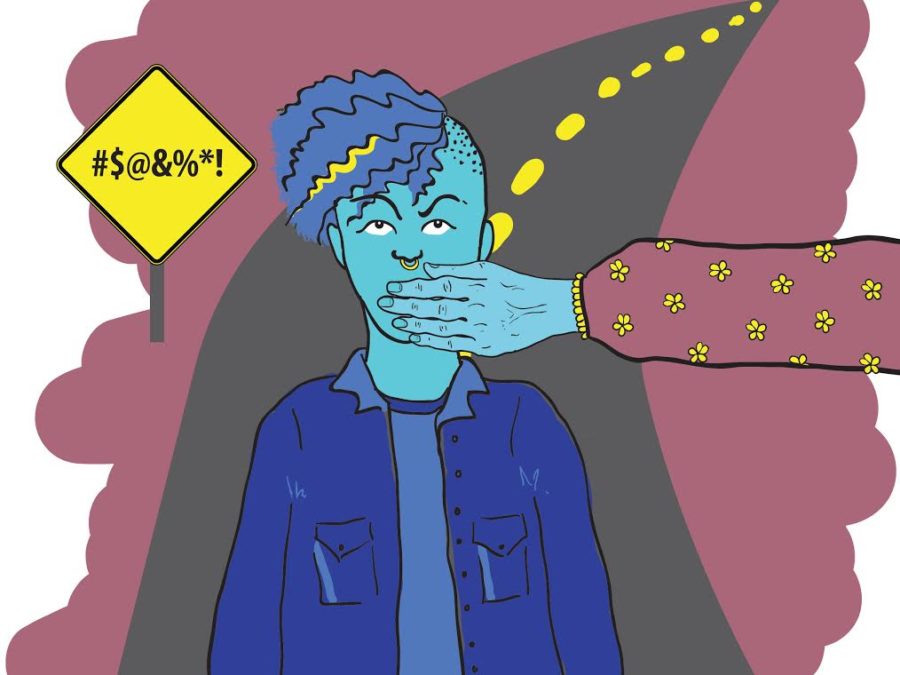The word “bitch” ran in one of my recent Oak Leaf opinion articles, and it sparked controversy and conversation. What was said has been said. Judge but only the writer for her diction. But, averting your eyes from the “ugliness” of the world will only further diminish your acceptance of diversity of opinion, especially when an opinion is delivered with a strong voice.
Keep in mind, as Santa Rosa Junior College’s opinion editor, I’m writing for young adults, most of whom are much more accepting of swear words than older generations. My work is written for people my age who understand the context and aren’t offended by a play on words.
Unfortunately there’s a generational divide between millennials and their predecessors: The Silent Generation, Baby Boomers and Gen X.
The divide is seen in social situations, political stances and moral choices. The divide also separates older generations who consider swear words taboo, and younger generations (like mine) who don’t find them offensive.
Older generations take offense when they’re confronted with words that don’t frequent their mouths, but surely obscenities must cross their minds. They associate rough language and lifestyles with sailors and convicts rather than people with valid opinions expressed through dynamic semantics.
We’re all adults, so why can’t the use of colorful language be acceptable in situations that don’t elicit hate? Isn’t the meaning conveyed by the word more important than the word itself?
Words like “fuck” and “damn” are commonly used in multiple fashions, tones and situations. The word “bitch” is the same.
Swear words are often used to convey messages and emotions more effectively than standard words. Some forms of profanity are featured in movies, shows and even the news.
“I use [swear words] around anyone besides my mom, dad and siblings because they help release anger and add flavor to my sentences,” said Ngoc Ly, 22, an SRJC psychology major.
Although we are exposed to this language on a daily basis, the choice to use it belongs to each of us.
Desiree Walker, 22, a SRJC digital media graduate, chooses not to use swear words because she doesn’t want to draw negative attention to herself. Walker, now majoring in cinema at San Francisco State University, also refrains from profanity because she has younger siblings who look up to her.
Around people her age, Walker creates new phrases and word play for harsher language like, “Fudge a mother ducker.”
Despite hating the use of “bitch” as an insult to women, Walker will clarify with friends if they are referring to a woman or someone who’s being distasteful. The word doesn’t have to be an exclusive insult towards women.
Although the word literally means a female dog, throughout the decades it has adopted new meanings. Depending on the context and intent for the word, “bitch” can be used to describe anything from an impolite person or a powerful woman. For example, a “boss-ass bitch.”
It can be used among friends to express excitement, but unfortunately it can still be used to convey hate. The speaker of the word holds the power.
In recent years, the word “slut” has been reappropriated by American feminists.
In 2015, model and actress Amber Rose started The Slut Walk, a transnational protest movement aimed at ending rape culture and slut shaming while empowering women and combating acts of sexual violence.
The act of holding an event using that perceived bad word allows women to take back the power the word “slut” and make its previous meaning powerless.
The connotations of “slut” have traditionally been negative because many people believe a woman who has sex with multiple partners is immoral. However, it’s the opposite for men who have sex with multiple partners. They are labeled as “studs,” which is a double standard in favor of keeping men at a higher moral rank than women.
Most other words and phrases aimed at women have negative connotations and historical references.
Just because a word had a negative connotation in the past does not mean they must continue to be used in derogatory ways.
Many believe profanity should be censored to avoid offending listeners. However, reducing profanity to euphemisms takes away from the potency of the context it’s used in.
Those who take offense to expletives refuse to understand changes in language and adaptations to current references and social culture.
You’ll end up so opposed to every little thing, word, phrase or thought that offends you when you take phrases out of context or lack a broader cultural scope that’s needed to understand that these words aren’t always meant to offend.
Consider the interpretation of those around you and the lenses they all peer through: do they all coincide? Of course not.
Must we censor ourselves for the sake of others’ feelings so much so that we lose our own individuality? Do asterisks really make a difference?
These words and our expression of them are what makes us unique and give color to life.




